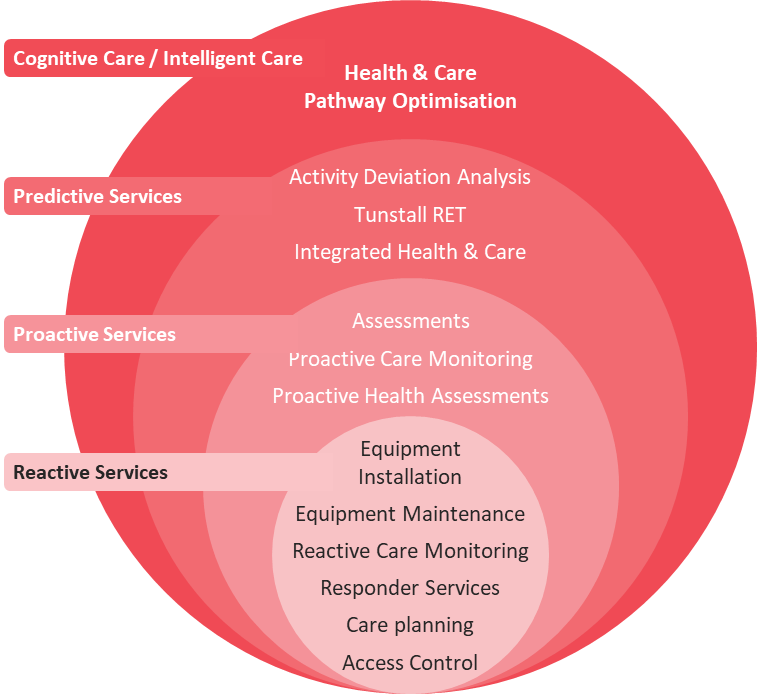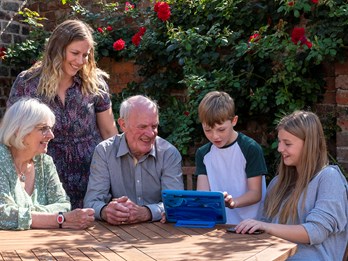TSA Chief Executive Alyson Scurfield in Conversation with Tunstall CEO Gordon Sutherland
In the first of a two-part conversation, TSA’s Chief Executive Alyson Scurfield gains some insight from Tunstall CEO Gordon Sutherland about developments happening within one of the UK’s market leaders in telehealth and telecare managed services, the ripple effect for the wider industry and how he sees the TEC sector developing when we come out of Covid-19 and its legacy.
TSA Chief Executive Alyson Scurfield in Conversation with Tunstall CEO Gordon Sutherland
Apr 20, 2020
The Background:
Tunstall Healthcare recently announced that it has secured funding to support its continued growth.In this time, the Company has almost doubled the number of users managed by its systems, while increasing its geographic footprint across Europe. Tunstall now operates in 17 countries globally and supports more than 5 million end users through its technology and service offerings in telehealth and telecare managed services.
The new funding from Barings, M&G and the lender group shows a significant commitment and will provide the Company with flexibility and improve the overall financial strength of the business, allowing the organisation to continue to build on the good work done to date with further development and innovations in the field of digital telecare and telehealth.
Alyson: We saw the press release about the change in ownership – when does this happen and what impact will it have on Tunstall?
Gordon: For Tunstall it really is excellent news as we now have a stable financial platform with sustainable levels of debt to enable investment in the company and market development. Further funding is available for acquisitions and partnerships.This means we can accelerate our transformation to a software solutions company, developing new solutions with our customers to help them manage an increasing number of users with a wide range of social and healthcare needs. In practical terms it means expanding our I&D capability across Europe, more response centre agents in most geographies and new business consultant roles to help our customers envisage and then build a new future.
The change in ownership deal is now subject to several legal steps including a European Commission review regarding Competition Law.We expect to be able to address any issues and the deal to be signed in late June/July.
Alyson: As a trusted member of the telecare/ telehealth industry what message would you like your customers and users to hear as a result of this change, and do you believe this to be good news for the industry and the sector overall?
Gordon: It is good news for the sector; a vibrant competitive supplier base will bring innovation and energy for change which eventually makes life better for the users or citizens who utilise what our industry can offer.
Just as we see across Europe, the benefits to the broader population of an integrated social care and health structure, in particular the realisation that effective social care delays entry into the ‘expensive health care structures’ and can accelerate the citizen to return home if hospitalised for any reason. Perhaps here in the UK, post Covid 19 we will see an increasing willingness to invest in social care to deliver effective ‘population health’ here. We want to work with you, our customers, to deploy data-driven solutions to enable your budgets go further and to keep your end-users safe.
Also, please do not believe any rumour you may hear about the financial instability of Tunstall. This is not the case but if anyone has any concerns please contact me or Gavin Bashar, our UK Managing Director.
Alyson: Moving away from this news, we have heard Tunstall talk about Reactive care, Proactive care, Predictive care and now we see references to Cognitive Care, sometimes referred to as Intelli-care. Can you explain what they mean and why is Tunstall so committed to this concept?
Gordon: Reactive care is a label we give to what is the well-established model of telecare - it means we react to the user who presses the button/ trigger / sensor for help.We offer 24/7/365 service levels and this is the service upon which Tunstall has built its reputation.
Proactive Care is an agreed package of care which can encompass the above plus social care visits plus, an agreed schedule of outbound calls from our teams to check the user is well and has followed whatever actions were expected from them.Our business in Spain has been operating this way for some time and the results (soon to be published) in terms of decreased GP visits, visits to A&E, extended time at home before entering a Nursing home are very impressive.
Predictive Care is all the above, and additionally we apply the data gathered from ambient sensors deployed throughout the home to detect any changes in routine which may suggest the onset of a health care risk.Examples are time in bed, frequency of in and out of bed or bathroom usage patterns altered dramatically. These changes are then notified to the relevant provider of the service.
Cognitive or Intelli-Care is one step further where we gather data, with the citizen’s approval, of their lifestyle, exercise, diet, vital signs etc., which is then added to the data from social service and their healthcare records.This data is collected when the user is at home or out and about and is then continually analysed to deliver ‘nudge’ social or healthcare interactions from the authority or from family and friends. It will also detect changes in vital signs which may require urgent intervention.This system is in its infancy but does represent where we are taking our organisation.
This picture may help understand this further:

Coming up in Part Two: Alyson and Gordon discuss what are the anticipated changes to our Health and Social Care services sectors and the proposed strategic direction of TSA.

